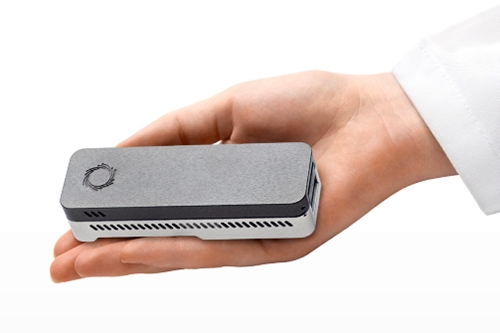30 September 2015. Astronauts aboard the International Space Station will take part in experiments testing the feasibility of a portable DNA sequencing device in space. The proof-of-concept test of the hand-held MinIon DNA sequencing device is a project of National Aeronautics and Space Administration.
The MinIon, made by Oxford Nanopore Technologies in the U.K., is a disease surveillance system that analyzes DNA from blood samples, and operates as a plug-in peripheral on a laptop computer. Because the MinIon is powered by the host laptop computer, it does not need an additional power source, unlike high-powered conventional DNA sequencing systems.
NASA’s goal in this project is to determine the practicality of DNA sequencing under the constraints of space flight, including microgravity. If DNA sequencing is possible under these conditions, it can make possible faster identification of organisms, diagnose infectious disease, and collect health data on space crews, as well as aid in detecting other life based on DNA encountered in the universe.
A key objective is to provide real-time tools for performing these tasks, which is not yet possible. “Meeting these needs relies on returning samples from space to Earth and subsequent ground-based analysis, which takes time,” says NASA project manager and microbiologist Sarah Castro in an agency statement. “Real-time analysis could inform scientific investigations, measure the impact of spaceflight on the human body, inform medical interventions and define the effectiveness of countermeasures.”
In the International Space Station, crew members will perform a series of DNA sequencing tests on bacteria, bacteriophages — viruses that infect bacteria — and samples from lab rodents with known genomic characteristics collected on earth. Researchers back on earth will be able to monitor the performance of the MinIon device. If these initial tests are successful, says the agency, it will allow the device to be used in a wide range of scientific and medical functions.
Oxford Nanopore, a spin-off enterprise from University of Oxford founded in 2005, licenses technology from the lab of biochemistry professor Hagan Bayley. The company’s technology is based on straining and isolating individual DNA strands through nanoscale pores in a membrane that allows for electronic sequencing processes to identify the base components of DNA passing through the pore.
NASA did not give a schedule for testing the MinIon device at the International Space Station.
Read more:
- Allied Minds Forming Space Signaling Company
- Astronauts to Eat Space-Grown Vegetables
- Commercial Space Launch Site Slated for New Zealand
- NASA Challenge Seeks Elements for Human Presence on Mars
- Hand-Held DNA Sequencer IDs Bacteria, Viruses
* * *


 RSS - Posts
RSS - Posts
You must be logged in to post a comment.